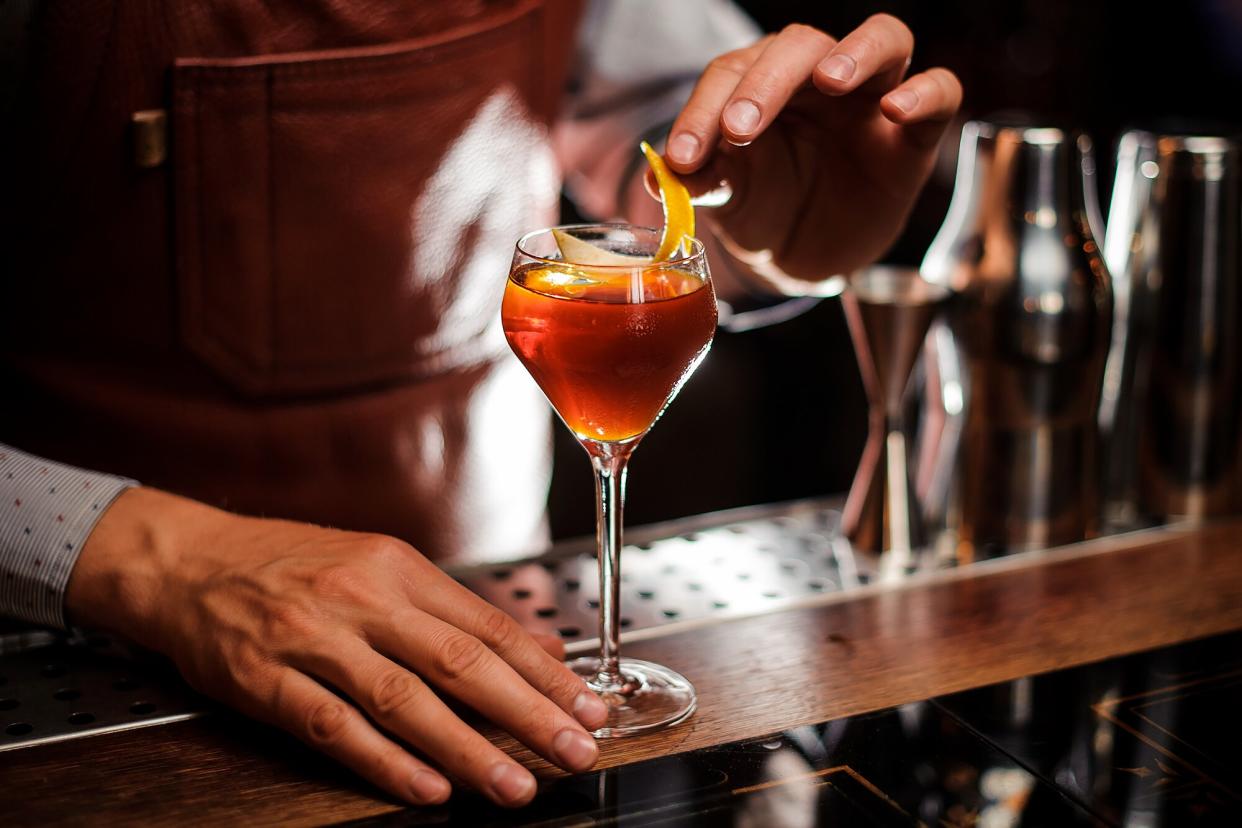What Is the Difference Between a Cocktail and a Mixed Drink?

Maxim Fesenko / Getty Images
The cocktail world is full of never-ending debates: Is cognac or gin better for a French 75? Are we using vodka or gin for martinis? But before you get that far, start with the basics: What's the difference between a cocktail and a mixed drink? It sounds simple, but even though many people use the two terms interchangeably, there is a difference. That said, how precisely they're defined is also up for debate.
"A mixed drink has a minimum of two ingredients, but once you get to a third ingredient, it's a cocktail," says Keith Meicher, head bartender at Sepia in Chicago, who was behind the stick pouring vodka sodas (a mixed drink) and shaking gin with rhubarb and lime (a cocktail) when I asked him this question. "So all cocktails are mixed drinks," Meicher says. "A mixed drink can also be a highball; I don't consider a highball a cocktail."
Joe Stinchcomb, owner of Bar Muse in Oxford, Mississippi, doesn't either. "A mixed drink is a 'one and;' Jack and Coke, vodka and tonic, gin and tonic," he says. "A cocktail is something that takes time to make and create. You figured out that you want pineapple, mango, vodka, and lime, shook it, and poured it into the glass. To me, that's a cocktail." Though they're in agreement about a highball, when asked how to define an Aperol spritz, both bartenders paused. Stinchcomb and Meicher make it with Aperol and sparkling wine (many recipes also call for sparkling water), but Stinchcomb decided on a mixed drink ("It's a 'one and'") and Meicher said, "I feel somehow it's a cocktail."
To get to the heart of this terminology, let's go back to the beginning. "Cocktail" was the original name for what we today call an "Old Fashioned," a drink made with a spirit, sugar, water, and bitters. Alba Huerta, owner of Julep in Houston, says "the cocktail was in line with a sling, a julep, a fix — we had all these different names for these drinks. Now we call them all cocktails." Huerta theorizes that Prohibition is the most likely culprit for why these categories began to blur; when bartenders left the industry or moved out of the country to continue bartending, they did not pass on this knowledge.
Nickle Morris, co-owner of Louisville's Expo, also thinks about the original "cocktail" when defining the term for himself. "It was taking a spirit and preparing it for enjoyment," he says. "I think it's about intention; if you don't put a lot of effort into the preparation, it's not a cocktail." Following that thinking, a rum and Coke is a mixed drink, but a Cuba Libre, with the addition of lime and Angostura, is a cocktail. Aside from the number of ingredients, intention plays a role in defining a drink. If prepared thoughtfully, a Japanese highball is a cocktail, he says. But if you're merely dumping the ingredients into a glass, it's a mixed drink.
For Huerta, it's the process of making the drink that's the differentiating factor in contemporary definitions of these two terms. "If you're stirring or shaking, that's a method that in the contemporary world is assigned to cocktails," she says. "Mixed drinks are like a vodka cranberry or something that's built and doesn't get shaken or stirred." By the same definition, a punch is a mixed drink since there's no "active energy." Huerta says that in Texas, that's the difference between a liquor license for bottle service and a cocktail bar. "They're asking us, 'Are you mixing it? Are you shaking it?'" she says. "If we sold only bottles, and people mixed their own drinks, that would be okay, as long as it's us not doing it."Whether it's the number of ingredients, the process, or the intention that differentiates a cocktail from a mixed drink, the easiest way to tell the two categories apart seems to be a question of simplicity. In all cases, a mixed drink is the more stripped down option, whereas a cocktail has more ingredients and requires more steps. But it's also a question of language, and Meicher says that he hears different generations call the same beverages different things. "'Mixed drink' is an older person's verbiage," he says. "But language adapts based on ease of understanding, and as long as the meaning is getting across, I think you can use whatever one you want."

